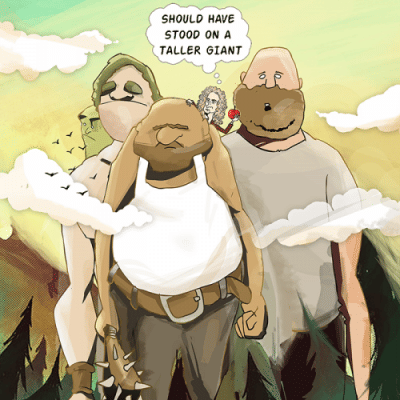The power of collaboration

But recently, I read two books—The Upright Thinkers by Leonard Mlodinow, which details the history of scientific development, and Against the Odds: The Remarkable Story of Risk by Peter L. Bernstein, which is about the history of risk management—and ended up getting an interesting insight from both: much of the advancement of human history was not through individual effort, but through crossovers of great ideas and remarkable people, who decided to discuss and improve on each others' concepts.
Newton's law of universal gravitation was the result of a problem given to him by Edmund Halley (of Halley's Comet), who in turn found out about it through the works of Galileo and Copernicus. This is why Newton was known to remark: "If I had seen further than anyone, it was because I stood on the shoulder of giants". The structure of the atom was refined by Niels Bohr after an interaction with Ernest Rutherford, while Einstein and Heisenberg were working on the works of Max Plank.
Similarly, in the arena of risk management, it was the popularity of coffee and setting up of coffee houses in London that triggered the formation of financial and leasing societies and also the first insurance company. Even the reason the Renaissance changed the landscape of Europe was not because great people were born, but thanks to the printing press and better means of communication, intellectual capacities across borders got connected, and the debates led to the spawning of what we now call modern science and education.
And this is something that I want to ask the reader to ponder on. The primary and the secondary education we have had, no matter how good and up-to-date, still relies heavily on individual effort, individual skills. We designed educational curricula to train knowledgeable "individuals". We talk about role models, innovators and scientists as individual geniuses, which contradicts most of the real stories. This makes a student independent, but such a curriculum fails to instil a key skill needed in tertiary education and life thereafter: the value of group work, the value of sharing.
One of the keys to success, as I can see around me, is collaboration. Innovations in today's world are not results of lone geniuses toiling away in secret laboratories, but the fruits of intellectual debate and sharing of ideas. This message is championed by Steven Johnson in his popular book Where Good Ideas Come from: The Natural History of Innovation, and also in many messages of Elon Musk. And this is something I believe we should teach our children. Instead of just being protective about their own notes and solutions, they should be encouraged to be in a discussion with fellow classmates. Instead of individual assignments, children should be motivated to work in groups. If we don't instil the value of group work early on, in later stages, this becomes increasingly difficult. In my career as a university lecturer, I have seen many instances where students are very good at exams and on individual assignments, but fail to perform in groups, and the excuses are pretty silly, e.g. my group mates don't listen/don't co-operate/don't pick up their phone. I believe if we can instil the importance of collaboration and free flow of information from early on, such problems will be rare.
Human science and knowledge have developed exponentially over the last decades. What we have learnt in the last 50 years is more than what we had discovered 500 years before those 50. At such crucial turns, I believe the key to intellectual growth of any youngster should not be limited to books and online self-study materials. It should expand to discussions, gatherings of the like-minded and sharing of ideas. As I keep saying, at least to anyone who will heed my words: Share and grow.
The writer is Lecturer and Co-ordinator of Risk Management and Applied Statistics at the Department of Management, School of Business and Economics, North South University. Besides academia, he is involved in training entrepreneurs and entry and mid-level managers, and in developing the startup ecosystem for Bangladesh.
Illustration: Ehsanur Raza Ronny

 For all latest news, follow The Daily Star's Google News channel.
For all latest news, follow The Daily Star's Google News channel. 



Comments